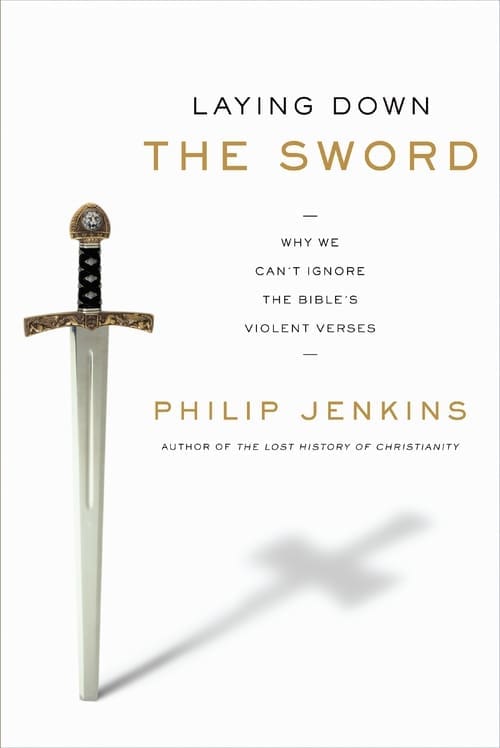A.A. Milne once observed that “The Old Testament is responsible for more atheism, agnosticism, disbelief…than any book ever written: It has emptied more churches than all the counter-attractions of cinema, motor bicycle, and golf course.” One doesn’t necessarily expect religious or historical insight from the author of Winnie the Pooh, but Milne has a point. From Spinoza and Thomas Paine to Ditchens, the “vicious God of the Old Testament” has aroused passionate moral indignation. Weighed in Enlightenment balances, the Biblical God is found wanting.
Philip Jenkins’s latest book focuses on the Old Testament passages that have served as prime exhibits in the prosecution of God, those that endorse holy war, massacre, and what Jenkins calls “genocide.” This is a natural theme for Jenkins, America’s leading expert on global Christianity. In his other work, he has identified flash points where religious friction might readily combust. In The New Faces of Christianity, he highlighted the Biblicism of southern hemisphere Christianity and he worries that Nigerian believers, say, might follow some earlier Christians by using these biblical texts to justify enormities.
His book has a message for European and American Christians, who, Jenkins thinks, need to become more familiar with and honest about the contents of their own Scriptures, especially in reaction to New Atheists and Islam. Since 2011, Western Christians have regularly condemned Islam as a religion of violence and the Qur’an as a blood-drenched book, often contrasting it with the Christian Bible that teaches a uniform message of love, mercy, and forgiveness. Jenkins finds in this opinion a curious institutional amnesia. Over several chapters, he makes a compelling argument that the Bible contains more, and more startling, violent texts than the Qur’an. Early in the book, Jenkins catalogues what he calls the “most disturbing conquest texts”—instructions to wage relentless war against the Amalekites until their memory is wiped from the world (Exodus 17:8-16; Deuteronomy 25; 1 Samuel 15), commands to wage herem (holy way, war of utter destruction) against Canaanites (Deuteronomy 7, 16, 20), and narratives that describe these instructions being carried out (Numbers 21, 31; Joshua 6, 8, 10). He doesn’t think Christians have much standing to criticize Islam for inciting violence, and he bluntly claims that “believers who ignore their own scriptural realities have no credible basis on which to debate atheists or secularists.”
Jenkins closes and locks the typical escape hatches, the editing and denial that Christians use to deflect criticism of embarrassing parts of the Bible. Archeologists claim that the conquest never happened as reported, but that only raises the question of why the Bible would describe it in such violent terms. Wars of extermination were not, contrary to some claims, common in the ancient world; herem was not business as usual. Jenkins is unconvinced by the Augustinian and Protestant argument that because God is perfectly just, His command to wipe out Canaanites must have been just. The notion that the Canaanites deserved everything they got because of their unique wickedness is, he says, a late interpolation. It cannot be said that these texts have made no historical difference. Jenkins details case after case to show how conquest and herem texts inspired violence by modern Christians and Jews.
Jenkins can sound like a non-hyperventilating version of Dawkins, but his solution is, perhaps surprisingly, not to suppress or delete the violent texts. On the contrary, he criticizes lectionaries for “cherry-picking” safe passages for liturgical reading (see in particular his damning table of skipped or partial passages). Jenkins also rejects the argument that what he, following Phyllis Trible, calls “texts of terror” came from a savage primitive stage of Israel’s history. That tactic neutralizes the most upsetting passages with a theory of progressive revolution or religious evolution, but Jenkins doesn’t think this works for chronological reasons. Like many contemporary Old Testament scholars, he believes Deuteronomy and Joshua were written between the eighth to the sixth centuries B.C., rather than in the thirteenth century. The depiction of herem warfare in Deuteronomy and Joshua had historical roots in ancient Israel’s Yahweh wars, but the stories were exaggerated so that Israel’s history could be used as a tool of reform during the late monarchy. In other words, quite late in Israel’s history, they would have been reading such violence back into their past.
This chronological adjustment implies that Deuteronomy and the history between Joshua and 2 Kings were produced at the same time as Israel’s writing prophets. That doesn’t seem to help Jenkins’s case. Torah and prophecy have often been seen as contradictory, the former much harsher and more ethnically exclusive than the latter. Jenkins considers them “complementary.” Prophets and historians together called Israel to radical monotheism, which both saw as the necessary foundation of a just society that would be absolutely pledged to the service of this one God. The prophetic vision of a future kingdom of God could be realized only if Israel purged all remnants of polytheistic idolatry, and history gave the prophets ideological support by linking their efforts to a long Israelite tradition. Jenkins argues that these disturbing texts should be read and preached as exhortations to whole-hearted devotion and separation from the world, especially when set alongside New Testament passages that emphasize the inclusion of all nations in God’s covenant. They are designed to shock the church into holiness.
Laying Down the Sword is an informative and challenging book, especially to those who, like me, aspire to work out political theology from Scripture. Yet neither Jenkins’s criticisms nor his own proposals are compelling.
Jenkins’s reconstruction of the historical setting for these texts is, like all reconstructions, questionable. Dating the Pentateuch has occupied hundreds of scholars and filled thousands of pages over several centuries, and I can’t even wade in for such a brief review. As a short cut, the argument that eighth-century historians would embellish their ancestral history in these particular ways is psychologically implausible. Jenkins says that the Deuteronomists aim to “grab readers’ attention” with tales of total conquest; they want to tell Israel, “it’s even worse than what the Assyrians do!” That would grab a reader’s attention for sure, but would Israelites want their ancestors remembered for being more bloodthirsty than Sennacherib? Would a Tea Partier spread stories of massacres to demonstrate that America has a long tradition of tax resistance?
The more fundamental weaknesses of Jenkins’s book are theological. Though Jenkins is aware that his own moral instincts were forged by Christianity, he doesn’t give enough thought to the relativity of modern morality. He takes modern sensibilities about violence more or less as a given. What counts as violent or vicious is what counts as violent and vicious to Jenkins and his contemporaries. Without argument, he can say that Deuteronomy 7 is “ugly” and “unacceptable,” and he can be confident that most readers will agree. He never grapples with the question of whether the Bible is intended to reshape our perceptions of what violence is, or what love, mercy, and justice entail.
This raises questions too large to unravel here, but let me offer three parameters for answering them. Behind all of these is a conviction about Scripture that I’m sure Jenkins doesn’t share. I believe the Pentateuch when it says that Yahweh ordered Israel to carry out herem warfare and promised to wage war against Amalek until he was exterminated. These texts were not concocted by a cabal of priests in the days of Josiah. They are the words of God to His people. What follows from that premise?
First, it implies something about God. As Jenkins himself observes, the conquest is part of the story that early Christians tell about Israel and Israel’s God. “The conquest story permeates the New Testament,” he says (citing Acts 7:45, 13:19; Hebrews 11:30-32; James 2:24-26). According to the Christian Bible, the commands to wage wars of utter destruction come from the same God worshipped by Paul and Stephen, the Father of the Lord Jesus. To say that the God of love is the God of herem creates more difficulties than it solves. If Scripture is truly our rule of faith, we cannot say anything else, and we must learn to see love as something more terrifying than we imagined, or to see herem as somehow an expression of divine kindness, or both.
The second implication is specifically Christological. It was a patristic commonplace that the Angel of the Lord was a preincarnate manifestation of the Son. In one of the theophanies, he appears to Joshua at the edge of the land, sword drawn, ready to lead Israel into battle (Joshua 5:13-15). Not only is the God of herem the same God as the God of Christians, but the Captain of the Lord’s hosts who leads the old Joshua toward Jericho is identical to the new Joshua, Jesus. Not for nothing does Jesus appear in Revelation 19, mowing down enemies with a sword that comes from His mouth. The difference between those two swords leads to the final point, which brings me a good deal closer to Jenkins: when we catch glimpses of New Testament herem, it is a spiritual war waged with the sword of the word and the spiritual weapons of justice, truth, peace, faith, witness, and suffering service. Christians aim to exterminate “Canaanites” as thoroughly as Joshua ever did, but we wipe them out by turning them into Israelites, by incorporating them into the body of the true Israel.
Miroslav Volf has written movingly about his recognition that “God isn’t wrathful in spite of being love. God is wrathful because God is love.” That sounds a paradox, but it is a biblical one, and we have to beware of the temptation to domesticate Scripture and tame Scripture’s God. On these issues, Volf’s insight is the beginning of wisdom.


